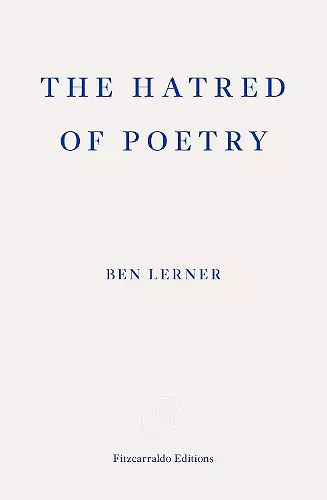The Hatred of Poetry
Understanding the complex relationship between art and disdain
Format:Paperback
Publisher:Fitzcarraldo Editions
Published:7th Jun '16
Should be back in stock very soon

Ben Lerner's The Hatred of Poetry examines society's complex disdain for poetry, revealing the art form's enduring relevance and significance.
In The Hatred of Poetry, Ben Lerner delves into the complex relationship between society and poetry, arguing that the widespread disdain for the art form reflects its undeniable relevance. He begins by acknowledging that poetry has often faced criticism, even from poets themselves. Lerner cites Marianne Moore's famous line, 'I, too, dislike it,' to illustrate a shared sentiment among many who struggle to appreciate poetry, yet find themselves drawn to it in various ways. This paradox forms the crux of his exploration, as he seeks to understand why poetry continues to provoke such strong emotions.
The essay takes a historical approach, examining the voices of poetry's detractors, starting with Plato, who famously claimed that poets had no place in an ideal society. Lerner explores the implications of such views, discussing how they have shaped the perception of poetry over time. He also reflects on the works of both celebrated and lesser-known poets, providing insightful readings of figures like Keats, Dickinson, and Whitman, as well as the notorious McGonagall. Through these analyses, Lerner highlights the tension between the lofty aspirations of poetry and the often harsh realities of its reception.
Ultimately, The Hatred of Poetry serves as a personal and engaging defense of a craft that Lerner believes is essential, despite its inherent challenges. He posits that the struggle between love and hate for poetry is a reflection of its deeper significance in capturing the human experience, making it a timeless pursuit worth exploring.
‘Reading Ben Lerner gives me the tingle at the base of my spine that happens whenever I encounter a writer of true originality. He is a courageous, immensely intelligent artist who panders to no one and yet is a delight to read.’
— Jeffrey Eugenides, author of The Marriage Plot
‘Lerner argues with the tenacity and the wildness of the vital writer and critic that he is. Each sentence of The Hatred of Poetry vibrates with uncommon and graceful lucidity; each page brings the deep pleasures of crisp thought, especially the kind that remains devoted to complexity rather than to its diminishment.’
— Maggie Nelson, author of On Freedom
‘Loathing rains down on poetry, from people who have never read a page of it as well as from people who have devoted their lives to reading and writing it ... Mr. Lerner skates across this frozen lake of pique with delicate skill ... The book achieves its goal in the most circuitous of ways: by its (lovely) last sentence, Mr. Lerner might get you longing for the satisfactions of the thing you’re conditioned to loathe.’
— Jeff Gordinier, New York Times
‘Superbly written, with a kind of soft-shoeing élan that wants to project humility but also delight.’
— Katy Waldman, Slate
‘[A] wonderful read ... [Lerner] begins hating poetry and urges us, in a Beckett-like way, to ‘hate better’. In between these almost identical poles there lies a fecund meditation on poetry.’
— Manchester Review of Books
‘The hatred of poetry, Mr Lerner shows, can suddenly and revealingly become a vehicle for bitter politics. Yet he also sees communal redemption in the strange bond people have with this ancient art form: if we constantly think poetry is an embarrassing failure, then that means that we still, somewhere, have faith that it can succeed.’
— The Economist
‘An important essay ... it doubles as a self-conscious ars poetica from a major American writer.’
— Flavorwire
‘The Hatred of Poetry doesn’t have a problem with gravity; it’s a heavyweight belter which demands concentration and patience. This longform essay by the noted novelist, poet and academic on the doomed, but precious, enterprise of poetry does, however, reward effort.’
— Jane Graham, The Big Issue
ISBN: 9781910695159
Dimensions: unknown
Weight: unknown
120 pages